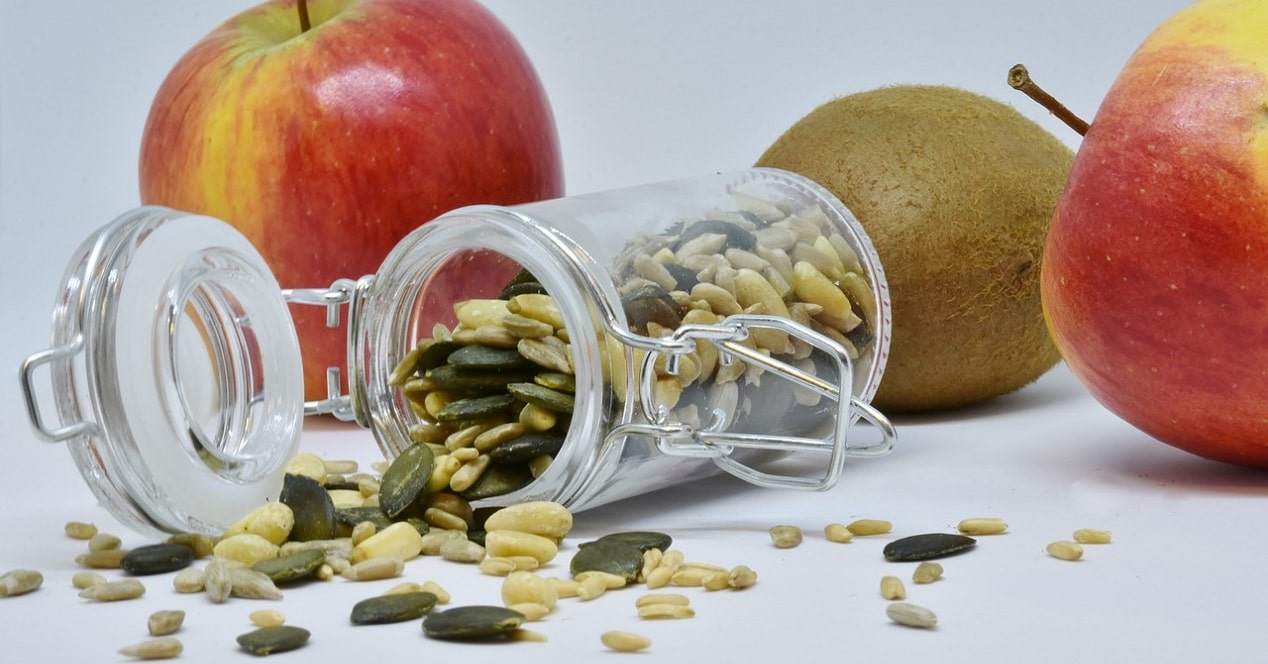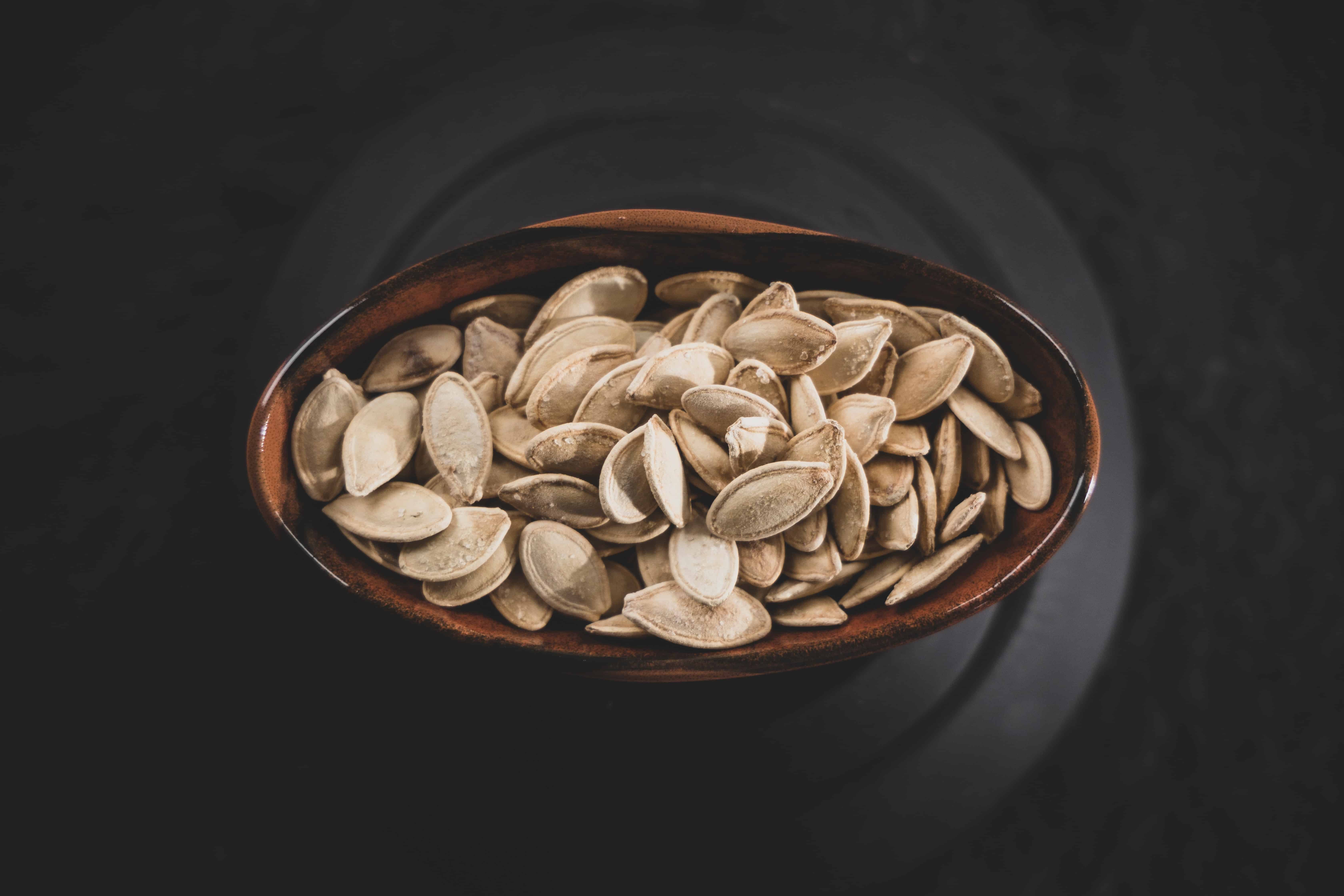
Pumpkin seeds, or pumpkin seeds, are an excellent food to incorporate into your diet. We are used to consuming them as snackHowever, they have great contributions to our health. The ease of introducing them into the diet means that we do not have to make a great effort to eat them, if we are not used to it.
Whether on toast, salads, pasta, or just about any dish, pumpkin seeds make a great addition. Just take a handful of these to let them act and enjoy their benefits. In addition, the flavor is really nice and gives any dish a very appetizing texture. Sometimes taking care of ourselves means getting to know some star foods like this.
Nutrients
Pumpkin seeds are also known as pumpkin seeds. Unlike the hard white seeds of a carved gourd, most seeds purchased at the supermarket are shellless. These shelled seeds are green, flat and oval. One serving (28 grams) of shelled pumpkin seeds has about 151 calories, mostly from fat and protein.
Additionally, a 28-gram serving contains:
- Fiber: 1,7 grams
- Carbohydrates: 5 grams
- Protein: 7 grams
- Fat: 13 grams (6 of which are Omega-6)
- Vitamin K: 18% of the recommended daily allowance
- Phosphorus: 33%
- Manganese: 42%
- Magnesium: 37%
- Iron: 23%
- Zinc: 14%
- Copper: 19%
They also contain plenty of antioxidants and a decent amount of polyunsaturated fatty acids, potassium, vitamin B2 (riboflavin), and folate. Pumpkin seeds and seed oil also contain many other nutrients and plant compounds that have been shown to provide health benefits.
Advantages
Eating pumpkin seeds has numerous beneficial effects on health.
Rich in antioxidants
Pumpkin seeds contain antioxidants like carotenoids and vitamin E. Antioxidants can reduce inflammation and protect cells from damaging free radicals. That's why eating foods rich in antioxidants can help protect against many diseases.
The high levels of antioxidants in pumpkin seeds are believed to be partly responsible for their positive health effects. In one study, pumpkin seed oil reduced inflammation in rats with arthritis without side effects, while animals given an anti-inflammatory drug experienced adverse effects.
Improves skin and hair
Its content in vitamins A and E; minerals like zinc and selenium; and essential fatty acids, make them true allies for the skin. In this way, it helps to treat cases of acne, eczema or aging, among others.
Pumpkin seeds take care of the hair and scalp. This is because they are rich in vitamins A, K and B (biotin), sulfur, zinc and Omega 3 fatty acids.
They take care of the nervous system
Pumpkin seeds contain L-Tryptophan, an essential substance for reducing symptoms in depressive states. Their contribution of zinc makes them a very powerful natural medicine to treat stress, anxiety, nervousness or insomnia.
So you already know. Taking care of yourself is very easy. It is important to take advantage of superfoods and their great contributions, to prevent future ills. Pumpkin seeds are an ideal option for your body and mind.
They reduce blood sugar
This is especially important for people with diabetes, who may have difficulty controlling their blood sugar levels. Several studies have found that supplementation with pumpkin juice or pumpkin seed powder lowers blood sugar levels in people with type 2 diabetes.
Pumpkin seeds' high magnesium content may be responsible for their positive effect on diabetes. An observational study in more than 127 people found that diets rich in magnesium were associated with a 000% lower risk of type 33 diabetes in men and a 2% lower risk in women. More research is needed to confirm these beneficial effects of pumpkin seeds on blood sugar levels.
They avoid insomnia
If we have trouble sleeping, we may want to eat some pumpkin seeds before going to bed. They are a natural source of tryptophan, an amino acid that can help promote sleep. Consuming about 1 gram of tryptophan per day is thought to improve sleep.
However, we would need to eat around 200 grams of pumpkin seeds to achieve the necessary amount of tryptophan. The zinc in these seeds can also help convert tryptophan into serotonin, which is then converted to melatonin, the hormone that regulates the sleep cycle.
Also, pumpkin seeds are an excellent source of magnesium. Adequate magnesium levels have also been associated with better sleep. Some small studies have found that taking a magnesium supplement improved sleep quality and total sleep time in people with low magnesium levels.
they take care of the heart
Pumpkin seeds are a good source of antioxidants, magnesium, zinc, and fatty acids, all of which can help keep your heart healthy. Animal studies have also shown that pumpkin seed oil can reduce high blood pressure and high cholesterol levels, two major risk factors for heart disease.
Other studies suggest that pumpkins' ability to increase nitric oxide generation in your body may be responsible for its positive effects on heart health. Nitric oxide helps to expand blood vessels, improving blood flow and reducing the risk of plaque growth in the arteries.

efectos secundarios
Eating pumpkin seeds can have some undesirable side effects. Eating too much, even when carefully chewed, can also cause intestinal gas and diarrhea.
These seeds are rich in fiber. You'll get just over 5 grams from a 30-gram serving, which means some of your carbs aren't fully digestible. When these undigested carbohydrates reach the large intestine, they are broken down by bacteria. Gas is a byproduct of this process, especially for people who aren't used to high-fiber foods.
Eating more fiber than you're used to can also lead to loose, watery stools. However, if you usually get diarrhea after eating pumpkin seeds, you may have an intolerance or sensitivity to this food. Constipation is also a possible, though less likely, side effect of eating them—the fiber you get from eating large amounts of pumpkin seeds can also temporarily slow you down.
Prevention of its side effects
Eating the seeds in moderation and with plenty of fluids can prevent digestive problems. 30 grams is the standard amount for an individual serving. The seeds have also been known to trigger migraine headaches in some people. However, if you're not prone to migraines, you probably won't get them from eating pumpkin seeds.
Avoid spoilage toxins
Although the unsaturated fatty acids in pumpkin seeds promote cardiovascular health, they also make them prone to spoiling quickly. Eating rancid seeds exposes you to free radicals, toxic compounds that can increase your risk of cancer, heart disease, and other chronic diseases.
Fresh and dried pumpkin seeds can stay in peak condition for about two months in an airtight container in the fridge. Seeds that smell musty, grease, or grass have probably gone rancid.
Does it affect testosterone?
True, they may not be as common as sesame and sunflower seeds, but if you're trying to boost your testosterone levels, they may be worth introducing into your diet. They are high in unsaturated fat and provide a number of nutrients that can help improve your testosterone levels. Despite the potential benefits, you should not use pumpkin seeds to treat any medical condition.
Magnesium
Among the nutrients that pumpkin seeds provide is magnesium. This mineral helps regulate the levels of a number of other nutrients in your body and supports the action of enzymes. Additionally, research published in the April 2011 issue of "Biological Trace Element Research" indicates that magnesium may promote elevated testosterone levels.
Leucine
Pumpkins contain leucine, an amino acid that can help promote fat oxidation and endurance, making it a popular sports nutrition supplement. Strength training athletes may find it particularly beneficial, as science indicates that consuming leucine can help increase testosterone levels.
Fats
Pumpkin seeds are similar to sesame and sunflower seeds in that they are high in fat. Each 30 grams provides approximately 14 grams of fat, which can be detrimental to a low-fat diet but beneficial for boosting testosterone.

How are they taken?
If we want to experience the benefits of pumpkin seeds, they are easy to incorporate into the diet. In many countries, they are a popular snack that can be eaten raw or roasted, with or without salt.
In addition to eating them alone, we can add them to smoothies, Greek yogurt, and fruits. We can incorporate them into meals by sprinkling them on salads, soups or cereals. Some people use pumpkin seeds in baking, as an ingredient for sweet or savory breads and cakes.
However, as with many seeds and nuts, they contain phytic acid, which can reduce the bioavailability of some nutrients you eat. If we regularly eat seeds and nuts, we may want to soak or sprout them to reduce their phytic acid content. Roasting them can also help.
recommended dose
The proper serving size for pumpkin seeds is 15 grams. It's a quarter of a cup. Although its consumption can reach up to half a cup, moderation is the key. Eating more pumpkin seeds than you need can cause bloating and stomach problems.
If taken in moderate amounts, pumpkin seeds help the digestive system significantly. But, with excessive consumption, too much fiber can lead to constipation. It could also result in weight gain, the opposite of the goal. This happens because even if these seeds are low in calories, they still contain them. Overeating anything can cause fat accumulation. Furthermore, eating pumpkin seeds in excess can also cause intestinal inflammation and stomach pain.